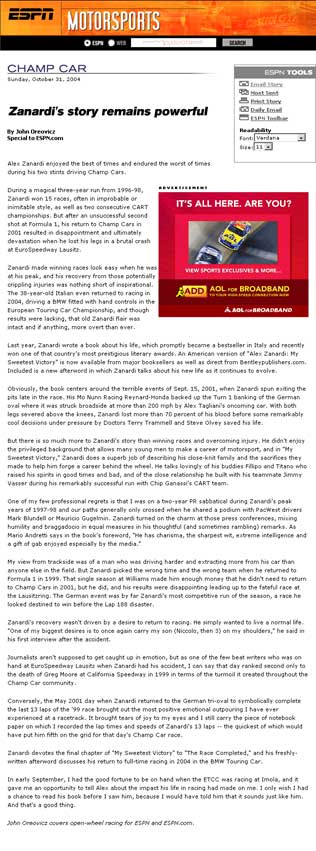
|
|
Alex Zanardi -
My Sweetest Victory
Price: $39.95
|
Zanardi's story remains powerful
By John Oreovicz
Special to ESPN.com
Sunday, October 31, 2004
Alex Zanardi enjoyed the best of times and endured the worst of times during his two stints driving Champ Cars.
During a magical three-year run from 1996-98, Zanardi won 15 races, often in improbable or inimitable style, as well as two consecutive CART championships. But after an unsuccessful second shot at Formula 1, his return to Champ Cars in 2001 resulted in disappointment and ultimately devastation when he lost his legs in a brutal crash at EuroSpeedway Lausitz.
Zanardi made winning races look easy when he was at his peak, and his recovery from those potentially crippling injuries was nothing short of inspirational. The 38-year-old Italian even returned to racing in 2004, driving a BMW fitted with hand controls in the European Touring Car Championship, and though results were lacking, that old Zanardi flair was intact and if anything, more overt than ever.
Last year, Zanardi wrote a book about his life, which promptly became a bestseller in Italy and recently won one of that country's most prestigious literary awards. An American version of "Alex Zanardi: My Sweetest Victory" is now available from major booksellers as well as direct from Bentleypublishers.com. Included is a new afterword in which Zanardi talks about his new life as it continues to evolve.
Obviously, the book centers around the terrible events of Sept. 15, 2001, when Zanardi spun exiting the pits late in the race. His Mo Nunn Racing Reynard-Honda backed up the Turn 1 banking of the German oval where it was struck broadside at more than 200 mph by Alex Tagliani's oncoming car. With both legs severed above the knees, Zanardi lost more than 70 percent of his blood before some remarkably cool decisions under pressure by Doctors Terry Trammell and Steve Olvey saved his life.
But there is so much more to Zanardi's story than winning races and overcoming injury. He didn't enjoy the privileged background that allows many young men to make a career of motorsport, and in "My Sweetest Victory," Zanardi does a superb job of describing his close-knit family and the sacrifices they made to help him forge a career behind the wheel. He talks lovingly of his buddies Fillipo and Titano who raised his spirits in good times and bad, and of the close relationship he built with his teammate Jimmy Vasser during his remarkably successful run with Chip Ganassi's CART team.
One of my few professional regrets is that I was on a two-year PR sabbatical during Zanardi's peak years of 1997-98 and our paths generally only crossed when he shared a podium with PacWest drivers Mark Blundell or Mauricio Gugelmin. Zanardi turned on the charm at those press conferences, mixing humility and braggadocio in equal measures in his thoughtful (and sometimes rambling) remarks. As Mario Andretti says in the book's foreword, "He has charisma, the sharpest wit, extreme intelligence and a gift of gab enjoyed especially by the media."
My view from trackside was of a man who was driving harder and extracting more from his car than anyone else in the field. But Zanardi picked the wrong time and the wrong team when he returned to Formula 1 in 1999. That single season at Williams made him enough money that he didn't need to return to Champ Cars in 2001, but he did, and his results were disappointing leading up to the fateful race at the Lausitzring. The German event was by far Zanardi's most competitive run of the season, a race he looked destined to win before the Lap 188 disaster.
Zanardi's recovery wasn't driven by a desire to return to racing. He simply wanted to live a normal life. "One of my biggest desires is to once again carry my son (Niccolo, then 3) on my shoulders," he said in his first interview after the accident.
Journalists aren't supposed to get caught up in emotion, but as one of the few beat writers who was on hand at EuroSpeedway Lausitz when Zanardi had his accident, I can say that day ranked second only to the death of Greg Moore at California Speedway in 1999 in terms of the turmoil it created throughout the Champ Car community.
Conversely, the May 2001 day when Zanardi returned to the German tri-oval to symbolically complete the last 13 laps of the '99 race brought out the most positive emotional outpouring I have ever experienced at a racetrack. It brought tears of joy to my eyes and I still carry the piece of notebook paper on which I recorded the lap times and speeds of Zanardi's 13 laps -- the quickest of which would have put him fifth on the grid for that day's Champ Car race.
Zanardi devotes the final chapter of "My Sweetest Victory" to "The Race Completed," and his freshly-written afterword discusses his return to full-time racing in 2004 in the BMW Touring Car.
In early September, I had the good fortune to be on hand when the ETCC was racing at Imola, and it gave me an opportunity to tell Alex about the impact his life in racing had made on me. I only wish I had a chance to read his book before I saw him, because I would have told him that it sounds just like him. And that's a good thing.
John Oreovicz covers open-wheel racing for ESPN and ESPN.com.
Read this review on ESPN.com at: http://sports.espn.go.com/rpm/news/story?id=1913460
![[B] Bentley Publishers](http://assets1.bentleypublishers.com/images/bentley-logos/bp-banner-234x60-bookblue.jpg)


